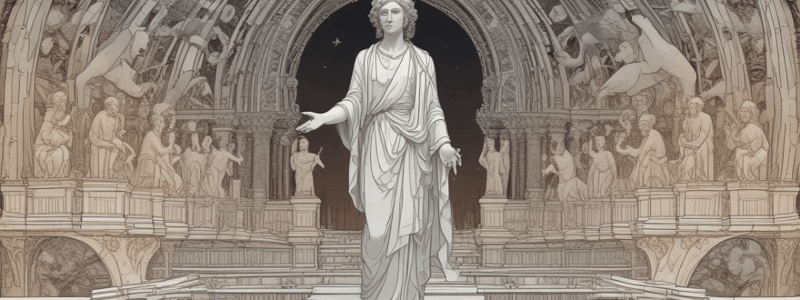Podcast
Questions and Answers
What is the name of the book in which John Rawls published his theory of justice in 1971?
What is the name of the book in which John Rawls published his theory of justice in 1971?
- The Philosophy of Justice
- A Theory of Fairness
- Justice and Fairness
- A Theory of Justice (correct)
What is the term for the hypothetical situation where individuals form a society, unaware of their future social positions, talents, or outcomes?
What is the term for the hypothetical situation where individuals form a society, unaware of their future social positions, talents, or outcomes?
- The Social Contract
- The Veil of Ignorance
- The Justice Principle
- The Original Position (correct)
What is the principle that states each person has an equal right to the most extensive liberty compatible with a similar liberty for all?
What is the principle that states each person has an equal right to the most extensive liberty compatible with a similar liberty for all?
- The Maximin Rule
- The Liberty Principle (correct)
- The Difference Principle
- The Pareto Principle
What is the principle that states social and economic inequalities are permissible only if they benefit the least advantaged members of society?
What is the principle that states social and economic inequalities are permissible only if they benefit the least advantaged members of society?
What is the term for the institutional framework of a society, including the political, economic, and social systems?
What is the term for the institutional framework of a society, including the political, economic, and social systems?
What is the rule that states social and economic policies should be designed to maximize the minimum benefits to the least advantaged members of society?
What is the rule that states social and economic policies should be designed to maximize the minimum benefits to the least advantaged members of society?
Flashcards are hidden until you start studying
Study Notes
Rawls' Theory of Justice
Overview
- Developed by John Rawls, a American philosopher
- Published in 1971 in the book "A Theory of Justice"
- A comprehensive and influential theory of justice and fairness
Key Concepts
- The Original Position: A hypothetical situation where individuals come together to form a society, unaware of their future social positions, talents, or outcomes.
- The Veil of Ignorance: A thought experiment where individuals in the Original Position make decisions without knowing their personal characteristics, ensuring fairness and impartiality.
Principles of Justice
- The First Principle (Liberty Principle): Each person has an equal right to the most extensive liberty compatible with a similar liberty for all.
- The Second Principle (Difference Principle): Social and economic inequalities are permissible only if they benefit the least advantaged members of society.
The Difference Principle
- The Maximin Rule: Social and economic policies should be designed to maximize the minimum benefits to the least advantaged members of society.
- The Pareto Principle: A situation is considered just if it is impossible to make one person better off without making someone else worse off.
The Just Society
- The Basic Structure: The institutional framework of a society, including the political, economic, and social systems.
- Justice as Fairness: Justice is achieved when the basic structure of a society is designed to ensure fairness and equality for all members.
Criticisms and Contributions
- Critiques of Utilitarianism: Rawls' theory argues that utilitarianism, which prioritizes the overall happiness of society, can lead to the exploitation of minority groups.
- Influence on Modern Political Philosophy: Rawls' theory has had a significant impact on modern political philosophy, influencing debates on justice, fairness, and equality.
Studying That Suits You
Use AI to generate personalized quizzes and flashcards to suit your learning preferences.



